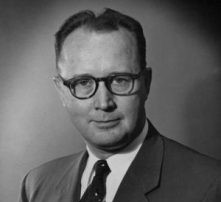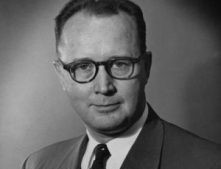Reynolds Johnson – The Man Who Created the First Ever External Hard Disk
Data storage – It certainly does not carve a niche in one’s mind. However, Imagine being able to save only 5 MB data in a machine that weighed a ton and measured a whole room. That machine was the start of a journey that has resulted in accommodating the technology to create better and higher standards of living. It was the first external Hard Disk ever invented. Well, and it was in 1952.
Reynolds B. Johnson was the ninth child of John and Elizabeth Reynolds and was born in Minnesota on July 7th,1906. He was a simple school going boy who displayed a keen interest in technical and mechanical sciences. Johnson was interested in workings of the machines and exhibited his ability to the world by creating and demonstrating a working model of a submarine in a horse trough. He graduated from one of the best private schools- Minnehaha Academy and went on to pursue a BS in Educational Administration as a part of his higher education from the University of Minnesota.

A teacher by profession, Johnson decided to return to his original occupation and improve its status quo. In 1932, Johnson had an idea to create a device that could grade the standardized tests and dissipate horrors associated with it. He tasked two of his pupils to work under his directions to create such a device. He called it the “mark-sense technology”, and this was the official start to his career as an inventor. Technology-giant IBM hired him as an engineer and bought rights over his invention. The company sold his test scoring machine from 1937 onwards. Other companies such as Bell System used mark sense technology to record calls, and utility companies used it to record meter readings. The government organizations used it under the name “electrographic” technology.
Since then, his role at IBM was not limited to an engineer, but further expanded, when he led a research team at IBM’s research laboratory, with the objective of improving current data storage and retrieval solutions. His ideas are being worked on even today.
He created a machine that could store data using aluminium and magnetic drums, making the first imprint of a data external storage device on the world. His inspiring work in the field of data storage made him known as the “Father of Hard Disk Drive”.
Johnson was one of the most influential inventors of this century. His life is marked with almost hundreds of patents relating to storage and technology. He was an influential figure in the toy industry, too. He implanted technology by inventing “microphotography” in simple toys. Fischer Price also used Johnson’s technology in their “Talk to my books”. He is also famous for creating handy videocassette tapes bettering the original ones made by Sony.
Johnson’s visionary mind was recognized throughout the world. He was a recipient of several awards such as Franklin Institute’s Certificate of Merit, in 1996, and the National Medal of Technology, in 1986. Institute of Electrical and Electronic Engineers ( IEEE) established the “IEEE Reynold B. Johnson Information Storage Systems Award” in 1991. The award is given to the inventors for their outstanding contributions.
Today, we dream of getting our desired things without making a splash in the water. It would be a disgrace if we do not remember a person who has provided the world with uncanny inventions, not only in the field of technology but also in the field of education. In 1966, Johnson made a bold prediction and a correct one, too, about the future of the education system: “The classroom of the future will be as different from today’s as the computer centre is different from the accounting room with its high stools of a few decades ago.” Such pioneering vision could only be compared to today’s Bill Gates, Jeff Bezos and Elon Musks.

Gaurav is a passionate writer and has been writing for the past 2 years. He loves dogs and is, specifically, fond of pugs. He also enjoys playing football.




